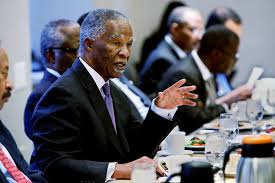Nigeria and several other countries in West and North Africa lost about $407 billion between 2001 and 2010 due to trade mispricing, mostly caused by commercial tax avoidance by multinational corporations. This was disclosed by Hon. Irene Ovonji-Odida, a member of the African Union (AU) and United Nations Economic Commission for Africa (UNECA) High-Level Panel on Illicit Financial Flows (IFFs), popularly called the Mbeki Panel.
She made this known during her keynote address at the National Conference on Illicit Financial Flows held in Abuja on Tuesday. Ovonji-Odida said that 65 percent of illicit financial flows from the African continent were a result of tax avoidance, translating to the massive $407 billion loss in just 10 years.
She noted that the remaining illicit flows came from organised crime (30 percent) and official corruption (5 percent), underscoring how multinational corporations take advantage of trade loopholes to deny African governments crucial tax revenue.
The Mbeki Panel, set up by the AU and UNECA, was tasked with investigating the root causes of illicit outflows from Africa and advising on practical solutions. The panel found that while corruption and organised crime are serious issues, the bulk of Africa’s losses come from complex tax schemes, often structured legally by multinational companies using mismatches in international tax laws.
“These practices may not always be illegal,” Ovonji-Odida said, “but they subvert the intent of tax laws and exploit mismatches between national legal frameworks to avoid tax liabilities, often depriving African countries of vital revenues.”
To curb these practices, the panel recommended far-reaching global reforms, including a United Nations Tax Convention, mandatory country-by-country reporting for multinationals, automatic sharing of financial data between countries, and increased transparency on the true owners of corporations.
Speaking at the same event, Executive Chairman of the Federal Inland Revenue Service (FIRS), Dr. Zacch Adedeji, described Nigeria’s situation as urgent, revealing that the country loses about $18 billion every year to illicit financial flows. He said much of this loss is due to aggressive tax avoidance by multinational firms that take advantage of outdated and opaque tax treaties.
Adedeji said that FIRS is working on renegotiating some of Nigeria’s Double Taxation Agreements (DTAs), which he said may currently enable capital flight. “I have personally initiated renegotiations with several jurisdictions to align our treaties with present economic realities,” he stated.
The FIRS boss also unveiled new efforts aimed at improving tax compliance, including the launch of a Tax Intelligence and Automation Department that will use data analytics and third-party information to detect suspicious transactions in real time.
“This is not just about digital infrastructure—it’s about digital vigilance,” Adedeji stressed, adding that enforcement alone won’t be enough. He called for globally coordinated efforts and modern intelligence techniques to track financial crimes.
The Minister of State for Finance, Dr. Doris Uzoka-Anite, echoed similar sentiments. She said the fight against illicit financial flows demands a “whole-of-government and whole-of-society” approach, stressing the need for stronger inter-agency cooperation and modernised tax frameworks.
She outlined three major areas of reform: closing legal loopholes that allow tax evasion, enforcing ownership disclosure and stronger corporate governance, and investing in smart technologies to detect and prevent IFFs.
According to her, the Ministry of Finance is deepening partnerships with key institutions including the Central Bank of Nigeria, FIRS, Nigeria Customs Service, Corporate Affairs Commission, EFCC, and the Nigerian Financial Intelligence Unit to strengthen Nigeria’s fight against illicit financial activities.
The conference, which brought together government officials, civil society, international partners, and tax experts, concluded with a consensus that the time for discussion has passed and that decisive, data-driven and collaborative actions must now be taken to protect Africa’s resources.
Ovonji-Odida warned that illicit financial flows are not just technical challenges but a political and development crisis. “Africa must take the lead in reforming global tax governance structures and demanding fairer treatment in international financial systems,” she said.
